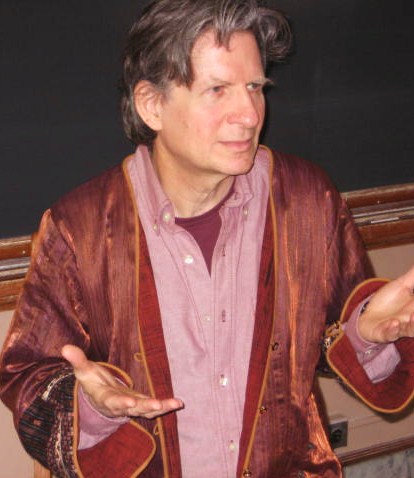Fuente: Radical Middle (2004), Chapter 3, "Journey to the Radical Middle," p. 22.
Mark Satin: Frases en inglés
1. maximize choices for every American (and for the U.S. as a whole) as much as possible;
2. guarantee a fair start in life for every American;
3. maximize every American's human potential as much as possible;
4. be of genuine help to everyone in the developing world.
Fuente: Radical Middle (2004), Chapter 1, "A Creative and Practical Politics," p. 6.
Page 180. The phrase "100 books" refers to Satin's list of 100 great New Age political books published since 1976. The term "Prison" refers to the Prison of consciousness, the basal concept in Satin's book.
New Age Politics: Our Only Real Alternative (2015)
Fuente: New Options for America (1991), Chapter 19, "Twenty-eight Ways of Looking at Terrorism," pp. 167–68.
I am afraid to go on and say what I don't like about socialism. ...
Pages 93–94. It's the spring of 1965. Satin had dropped out of college to become a volunteer for the Student Nonviolent Coordinating Committee (SNCC) in Holly Springs, Mississippi. The meeting above had been called by SNCC to explore SNCC workers' views.
Confessions of a Young Exile (1976)
Fuente: Radical Middle (2004), Chapter 2, "The Caring Person," pp. 17–18.
Page 201. The second word above was printed as "trying" in the second edition, but was printed as "refusing" in the first edition, page 78, and in the third edition, page 230. "Refusing" is consistent with Satin's argument.
New Age Politics: Healing Self and Society (1978)
to.
Page 180.
New Age Politics: Our Only Real Alternative (2015)
Page 11.
New Age Politics: Healing Self and Society (1978)
Page 6.
Manual for Draft-Age Immigrants to Canada (1968)
Fuente: Radical Middle (2004), Chapter 1, "A Creative and Practical Politics," p. 6.
Pages 196–97. Fall of 1966. Satin has dropped out of SUNY and is sitting in his girlfriend's apartment in Manhattan. The application is for Canadian immigrant status. Keith, a supportive college professor, is seen by Satin as a plastic sellout.
Confessions of a Young Exile (1976)
Fuente: Radical Middle (2004), Chapter 16, "You Can Have a Career and Be Political, Too," pp. 176–77.
Page 11.
New Age Politics: Healing Self and Society (1978)
Pages 5–6.
Manual for Draft-Age Immigrants to Canada (1968)
Fuente: Radical Middle (2004), Chapter 1, "A Creative and Practical Politics," p. 5.
planetary cooperation and sharing. ... In Pat VII ... I argue for a strategy that would involve ... (a) healing self, and (b) healing society.
Pages 7–8.
New Age Politics: Healing Self and Society (1978)
Economic growth. We proved that an economy could grow seemingly forever;
The welfare state. We proved that a society could be held together by giving people more and more rights, more and more "entitlements";
Policing the world. We proved that a nation could become so powerful and awe-inspiring that it could successfully police the whole world.
"Preface," p. vii.
New Options for America (1991)
Racism, militarism, exploitation, ecocide, etc., are also rooted in the Prison.
Page 7.
New Age Politics: Healing Self and Society (1978)
Page 206. Spring of 1967. Satin had flown home to Wichita Falls, Texas, to tell his family he was immigrating to Canada. His father is a college professor.
Confessions of a Young Exile (1976)
Fuente: New Options for America (1991), Chapter 13, "National Holistic Health Care Program: Too Sensible?," p. 100.
So by one A.M. we are on the road. ...
Page 40. It's the fall of 1964. Satin is a freshman at the University of Illinois at Urbana–Champaign. "Plastic" became one of his favorite adjectives.
Confessions of a Young Exile (1976)
Fuente: Radical Middle (2004), Chapter 11, "Long Live Biotech – With Adult Supervision," p. 116.
Fuente: Radical Middle (2004), Chapter 1, "A Creative and Practical Politics," p. 3.
Pages 132–33. The first sentence refers to early New Agers Donald F. Keys of Planetary Citizens, Ervin Laszlo, and Richard Falk.
New Age Politics: Our Only Real Alternative (2015)
Page 5.
New Age Politics: Healing Self and Society (1978)
Page 6.
Manual for Draft-Age Immigrants to Canada (1968)
Page 185. Satin had become president of SDS at SUNY Binghamton during the summer 1966 trimester. "Jean" is one of the far-left SDS leaders Satin had deposed. She is also the "girl" referred to n the previous quote.
Confessions of a Young Exile (1976)
especially political things
Page 5.
New Age Politics: Healing Self and Society (1978)
Fuente: New Options for America (1991), Chapter 17, "Siding With the World's Poor," p. 136.
